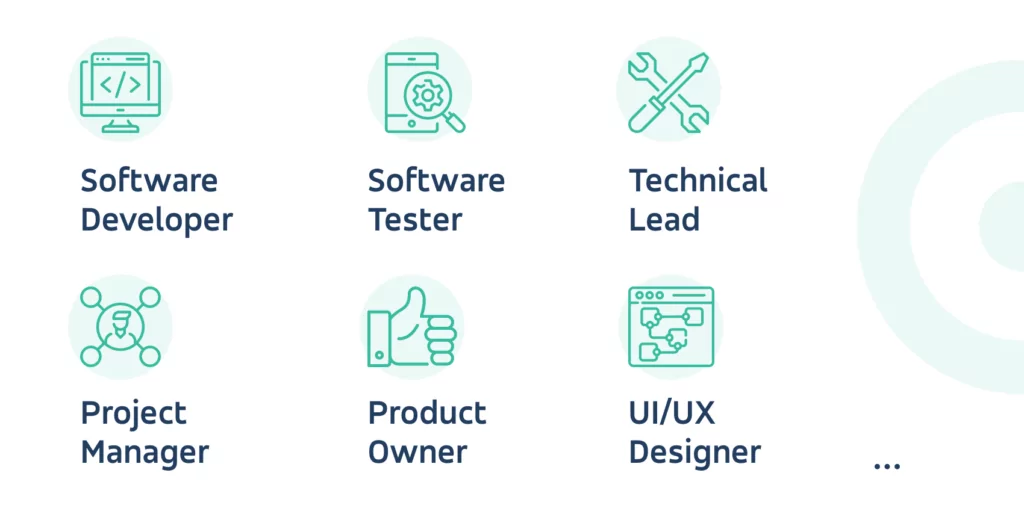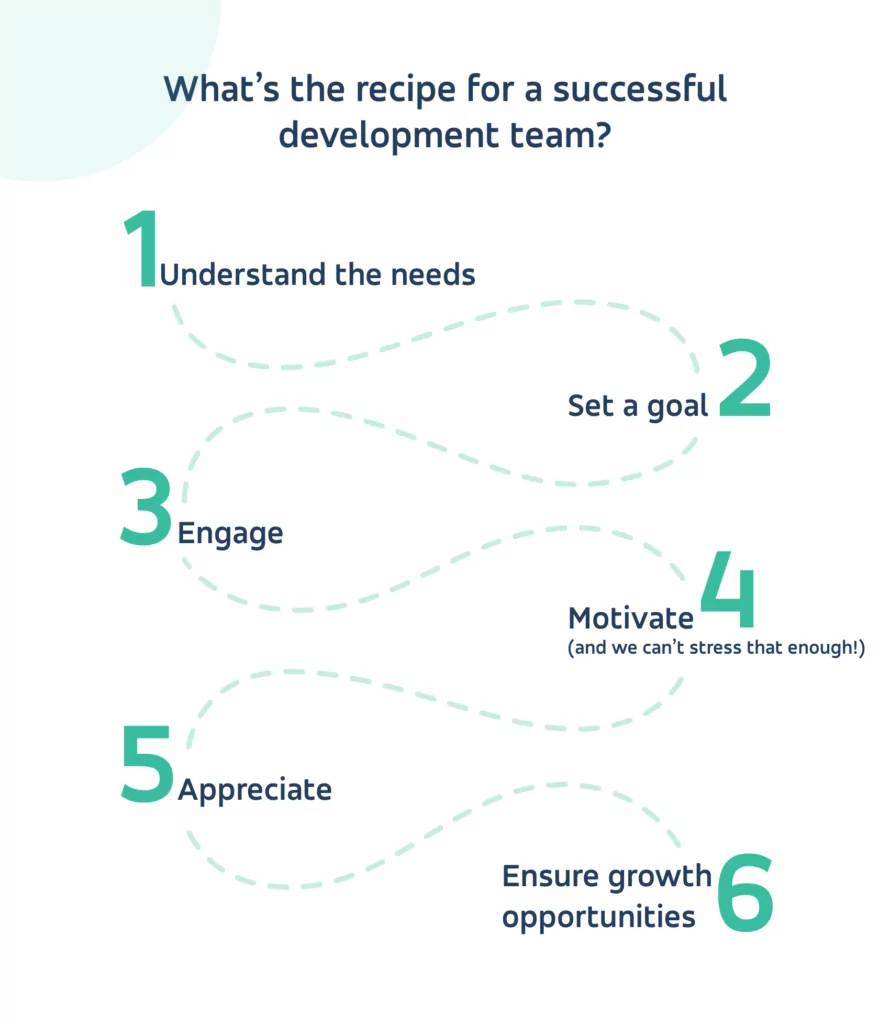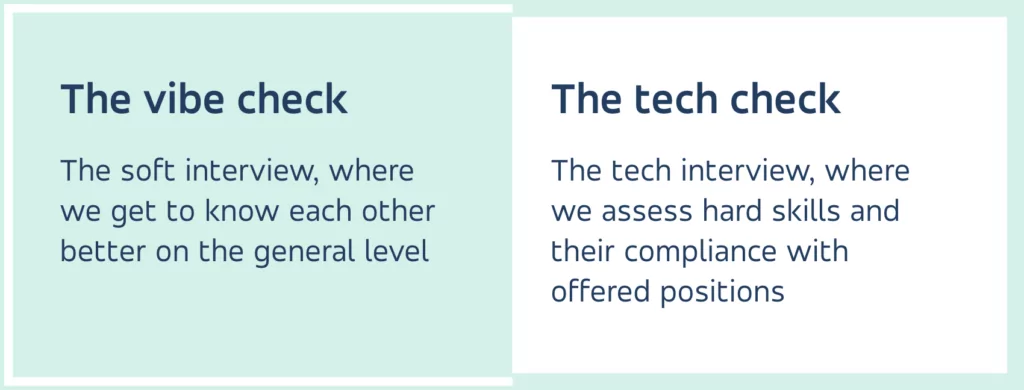Teamwork makes the dream work.
Some companies tend to overuse the phrase, but we know one thing for sure – software development (on a business level) is a team sport. In this article, we’ll share a part of our experience in recruiting, building, and maintaining software teams that deliver.
How to form efficient development teams?
First of all, what is a developer team?
This one’s easy. A group of developers, often supported by other specialists, working together on software projects. No matter if in-house or outsourced, the group cooperates closely to deliver achieved results.
Roles to be found in development teams include positions such as

Does an efficient developer team need all of the above roles to function and deliver? Absolutely not! Or rather – it depends. Teams are formed according to the needs, previously recognized and addressed. The situation looks different when providing outsourced teams to clients who already have their own in-house teams that need support in coding, different in case of building products from scratch for clients with no technical expertise aboard, and can result in a changed team structure anytime a different situation arises. As you can easily guess at this point – a team’s composition may change over time, not only resulting from employee rotation but from shifts in priorities and ending work in certain areas.
Our developers carry out tasks in various compositions, both as a support to IT departments on our client’s side and as complete development teams building whole projects, taking care of each aspect on the way.
Who to look for when rounding up the team?

Everyone’s invited. Especially when it comes to the professional background. The IT field is unique in this matter, as people with academic backgrounds, course graduates, and self-taught individuals can work equally well (however some differences are noticeable, but more in the general approach to software architecture). Different personalities cooperate within diverse teams, and since we value results over strict procedures, there’s space for both, extraverts, introverts, and everyone in-between.
Who to omit when building the next best developer team?
The lone wolf tech geniuses
While we’re all for working with other bright minds, we’re aware of the possible challenges of hiring geniuses in their field of expertise who struggle with teamwork. Not once and not twice did software development companies face unfavorable situations where the highly skilled but difficult in cooperation individuals walked away from projects, leaving teams with the challenge of maintaining their code. Termination of cooperation in such cases causes difficulties, as the decision itself is not easy, and communicating it to the person concerned may spark diverse reactions, some of them difficult to deal with.
The unfeedbackable individuals
We always assume people mean well. Sometimes errors or misunderstandings occur, and in such moments, we do what we can to help solve the problem. This requires feedback from peers and managers, followed by the anticipation that efforts will be made to bring things back on track. Individuals who continuously struggle with accepting received suggestions may not be promising in further cooperation.
The budget crashers
Money is important, and we all work not just for job satisfaction (as it’s darn hard to use it to pay our bills). However, the salary levels for each position are more or less finite. As a rule of thumb, in the IT field, when reaching a certain level of remuneration, employees are more motivated by what the job offers on the challenge side, allowing them to grow professionally. What we mean to say is that there will always be a company willing to pay more, but not necessarily offering more when it comes to personal development. Having this in mind, we offer satisfactory compensation, but aim to attract and retain professionals with the work we do.

Diversify the expertise level
Building teams with juniors only is a rather hazardous decision. In such cases, developers working with peers on the same expertise level won’t be able to grow in their field as no one will be able to provide them with the right feedback. Junior teams may grow technical debt in an uncontrolled manner (meaning the loan is taken without resources having sufficient skills to pay it in a managed way), and working with solely entry-level developers can be compared to building a house on a less robust foundation. We’d say it’s better to invest the most in concrete foundations, and consider the less-experienced staff to work on parts of the build (painting, carpentry, arranging tiles) that won’t cause safety hazards. Or allow juniors to cooperate with mids and seniors on the core elements, instead of approaching them on their own. Diverse, self-organizing, and well-equipped teams can achieve the desired synergy, allowing for the best results.
Additionally, we strongly disagree with a popular saying that “any specialist can be replaced with a finite number of students (or interns)”. It’s a peculiar approach, short-sighted to say the least, and highly probable to endanger the carried-out projects. Instead, we’re on the lookout for promising interns, who will join our team. Each year we hold summer internships with the hope of hiring the most talented people, later on, allocated with more experienced employees to continue learning.
How to properly assign tasks to people (and people to tasks)?
Delegating tasks can be a headache for managers, but knowing their team, their potential, and their capacities is the key to matching the right people with the incoming tasks. While allocating new hires to particular projects we make every effort to place developers where their skills will shine. Additionally, the workload should constitute a challenge to team members, triggering growth. Sure, our clients’ needs are the priority, and sometimes dull tasks need to be carried out, but we remember about the developers’ needs.
More mentoring, less supervision
Is there anyone enjoying micromanagement? (Perhaps except for overeager junior managers). Most developers prefer working independently, as much as possible. With great power comes great responsibility, and the people who can handle it with care are the best that can happen to a team. That’s why we trust our teams and refrain from micromanaging. Instead, we allow making mistakes, as long as they bring reflection and analysis for further improvement.
What’s the recipe for a successful development team?
Understand the needs

What to do when things go amiss?
Even in the most friendly environment with the best practices, something may go wrong while building a team or during further cooperation. Challenges may result from internal or external factors, but no matter their origin, the results could affect achieving objectives and as such, need to be taken care of. The sooner, the better for both the team and the project. The key to tackling emerging challenges is, as mentioned above, feedback. Most issues in projects are caused by processes, not by people. We make every effort to discuss possible solutions and strategies for implementation. Learning from every situation, we adapt to future scenarios.
Once again, how to build development teams?
This is how we roll.
Our HR department is always on the lookout for new highly skilled software developers to join the team. The needs – as we previously mentioned – vary depending on the seasons (as in workload, clients’ demand, shorter deadlines in high-priority projects, etc.). This means that sometimes we focus on acquiring more specialists proficient in certain areas. Sometimes we’re just casually searching for more tech bright minds to welcome aboard, knowing that new extensive projects are just round the corner.
Since we value our candidates’ time, our recruitment process is short and substantial. It can be boiled down to 2 steps:

The tech check: The tech interview, where we assess hard skills and their compliance with offered positions
We look for skills and disposition. Depending on current needs, we may be open to hiring individuals with slightly lower tech expertise in cases where the attitude and general impression convince us the person will be the right fit for the team. For the team in general, as during recruitment, we sometimes don’t know yet which project, in particular, will the new hire join.
The takeaway
There’s no one absolute truth in building developer teams. Various strategies can work equally well in different conditions.
We aim to acquire the best professionals who can cooperate efficiently within teams, delivering the desired results. On our side of the process, we strive to offer the maximum possible space for development, but aim to keep it real. No empty promises, both to our clients and our developers. We’re realists, there will be some less challenging tasks, and maybe even some meetings that could have been an email. But in the long run, it will all be worth it.
Do you look for a team of bright minds to carry out your software development project?
Book your one-hour free consultation and see what we can do for you.


